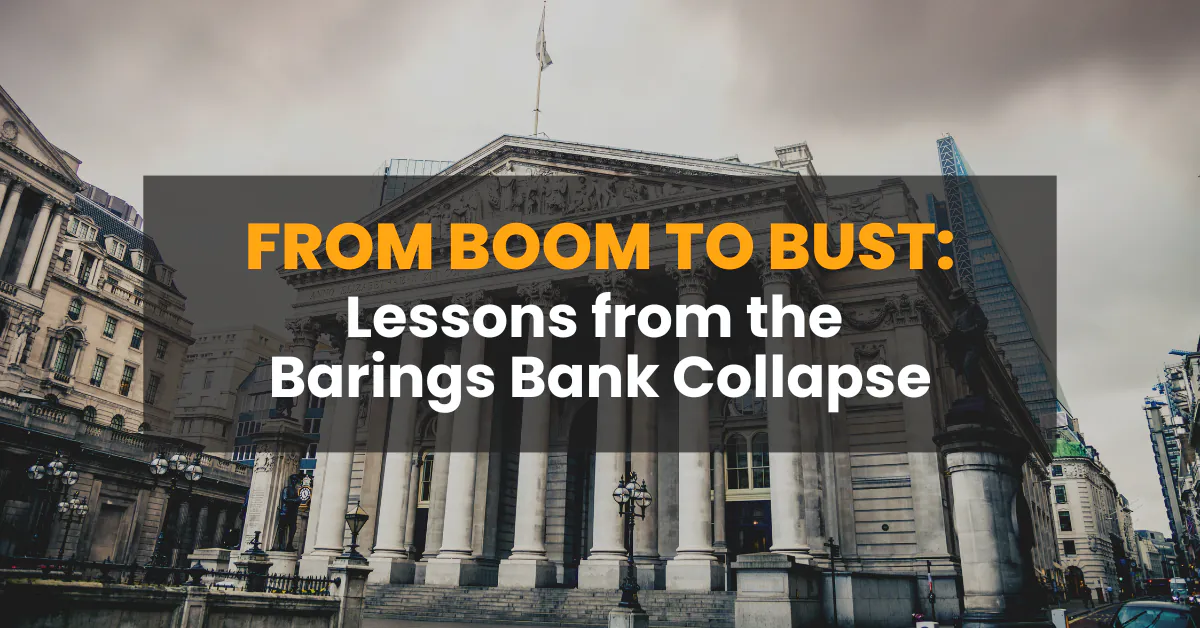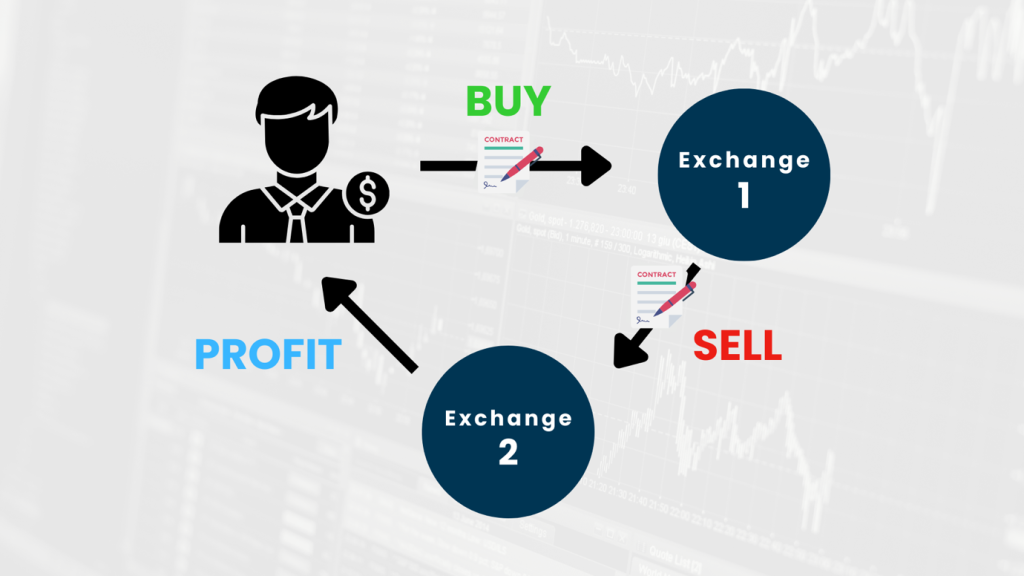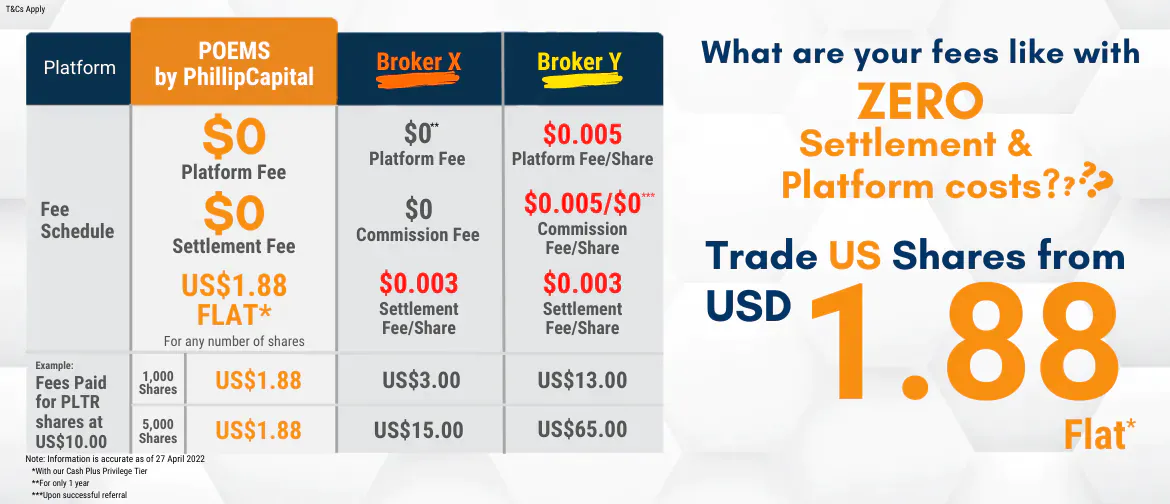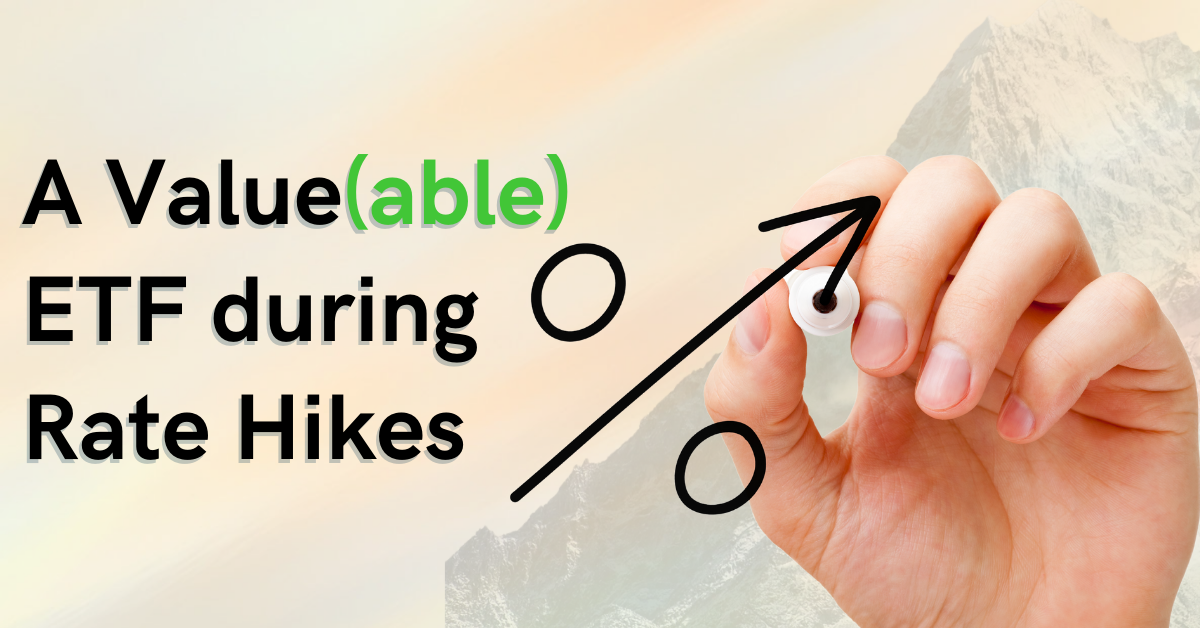From Boom to Bust: Lessons from the Barings Bank Collapse

Sam Hei Tung, Senior Dealer
Sam graduated from National University of Singapore with a Master of Science in Finance. He personally manages his own investment portfolio and does equity and economic research in his free time. Sam believes that education and information is essential to making good financial decisions.
Barings Bank was one of the oldest merchant banks in England with a long history since 1762. Throughout the years, Barings Bank played a pivotal role in the banking industry, extending its influence from North America to Amsterdam and even Singapore. However, the most recent memory of this once cornerstone financial institution in Britain is its sudden collapse of Barings Bank in 1995, caused by fraudulent investments made by a rogue trader named Nick Leeson in Singapore.
To fully understand the cause of Barings Bank’s downfall, it is essential to examine the events leading up to the collapse closely. Leeson began his career as a settlement clerk in the bank’s back-office operations, mainly to support the trading division with the necessary back-end support. As a diligent and overall good employee, he rose through the ranks and was appointed as General Manager of Barings Securities in Singapore.
This marked the point where Barings Bank made their first significant error, by allowing Leeson to oversee both back-office and trading operations. The necessity for a clear separation between back-office and trading operations is paramount to preventing potential manipulation and ensuring proper checks and balances. As a result, Leeson was able to falsify records and conceal losses in fictitious accounts [1]. Typically, in other banks, two distinct individuals are appointed as head of back-office and head of trading operations to mitigate such risks.
Owing to Leeson’s remarkable track record of generating substantial trading profits, he was given a considerable autonomy and was even promoted as Head of Trading at Barings’ Singapore branch. This decision marked Barings Bank’s second major mistake as Leeson was seen as a legendary figure in the bank, leading higher management to overly trust Leeson’s words. Consequently, the bank lacked proper risk management and oversight over Leeson’s trading activities.
Despite the downturn in the Asian financial markets, Leeson was consistently generating unusually high trading profits [2]. Barings Bank’s senior management failed to identify potential red flags, blindly believing that Leeson was simply exceptional in his role. There was never any questioning or investigation into the sustainability of Leeson’s trading strategies.
To maintain his “legendary trader” status and fame, Leeson was under such immense pressure to perform and generate profits at any cost that he engaged in fraudulent trades that speculated on Japanese Nikkei 225 Index futures and options [3]. Initially, Leeson used an arbitrage strategy that aimed to profit from the small difference in price between futures contracts from Singapore International Monetary Exchange (SIMEX) and Japan exchanges [4]. In principle, arbitrage strategy has low to no risk as contracts are bought and sold simultaneously to profit from the price difference (as shown in the image below).

Increasingly, he began to take massive speculative positions on Nikkei 225 Index futures and options. Should these positions prove profitable, Leeson would be heralded as a genius. Conversely, in the event of losses, Leeson would resort to a doubling strategy. It was evident that Leeson was also influenced by a loss aversion bias, where the distress of loss significantly outweighed the pleasure of a comparable gain, leading to his illogical and unpredictable behaviour in the face of escalating losses [5]. Leeson’s approach closely mirrored that of a desperate gambler faced with significant losses and growing debts. A quote from Leeson himself succinctly captured this mindset:
“I was determined to win back the losses. And as the spring wore on, I traded harder and harder, risking more and more. I was well down, but increasingly sure that my doubling up and doubling up would pay off … I redoubled my exposure.”
There were instances when his doubling strategy temporarily converted losses back into profits. However, by exponentially increasing risk in an attempt to recoup losses, he introduced a significant systemic risk to the bank and potentially to the broader market as well.
The risky strategies employed by Leeson inevitably led to catastrophic losses. In 1995, the collapse of Barings Bank was precipitated by Leeson’s speculative trading, which resulted in losses amounting to approximately US$1.4 billion, far exceeding the bank’s available capital. This financial disaster highlighted the dire need for robust risk management and regulatory oversight within the banking sector.
Following the revelation of the losses, Leeson was arrested in Germany and extradited to Singapore. In 1995, he was sentenced to six and a half years in Changi Prison in Singapore for his role in the bank’s collapse, specifically for charges of forgery and fraud. His actions and the subsequent failure of Barings Bank served as a stark reminder of the vulnerabilities within the financial system and the potential consequences of unchecked speculative trading.
Key Takeaway from Barings Bank’s collapse

The Importance of Verification and Due Diligence in Finance
Investors must understand the importance of verifying and validating information within in the finance industry. It is essential for investors to conduct their own due diligence and independently verify any financial decisions, regardless of the credibility and trustworthiness of the analyst, expert, or institution involved. This principle applies across all financial activities, from investing and trading to even purchasing insurance products.

The Significance of Diversification
Barings Bank’s downfall was significantly attributed to its enormous exposure to a single trader, with substantial resources allocated to his activities. The failure of this strategy underscores the dangers of concentrating investments too narrowly. Investors are encouraged to diversify their portfolios to mitigate company-specific risk (unsystematic risk). Through diversification, investors can achieve a more favourable risk-adjusted return and create greater value over the long term.
Understanding your Investments
The complexity of an investment can often mask underlying risks. The collapse of Barings Bank served as a cautionary example, where, higher management failed to fully comprehend the methods by which Leeson was able to earn considerably large profits. This lack of understanding, coupled with blind faith in his strategies, highlighted a fundamental principle in finance: no risk, no reward. Leeson’s high returns were indicative of substantial risks being taken.
Caution Against High-Return Investments
The saying “If it is too good to be true, it probably is”, remains particularly relevant in the context of investments offering high returns with low risk. Such opportunities, exemplified by Leeson’s consistently exceptional performance and promises of high returns, are often either fraudulent or unsustainable. Investors are advised to evaluate investments not solely on the potential returns but also with a comprehensive risk management approach. Investing is a marathon, not a sprint, and requires a balanced perspective on returns and risks.
The Role of Financial Regulation
Financial regulation plays a crucial role in safeguarding both investors and the stability of the financial system. Following the collapse of Barings Bank, enhanced regulatory measures and scrutiny were implemented, leading to financial institutions being subject to more rigorous reporting and compliance requirements. As a result, customers should be prepared for, and understand the need for, increased due diligence processes when seeking to engage with more sophisticated investment opportunities. These regulations are designed to protect all parties involved and ensure the integrity of financial markets.
Conclusion
In conclusion, the collapse of Barings Bank in 1995 continues to serve as a stark reminder of how a single rogue trader can bring down a bank with over two centuries of history. The lessons to be learned from this event remain profoundly relevant in today’s financial landscape. They underscore the critical importance of verification and validation, the necessity of diversification, the wisdom of thoroughly understanding one’s investments, the caution required when approaching high-return investments, and the indispensable role of financial regulation.
These principles are not merely historical footnotes; they are essential guidelines that, if heeded, can prevent the recurrence of such financial catastrophes. As the financial world evolves, the saga of Barings Bank stands as a timeless reminder of the need for vigilance, wisdom, and prudence in investment and financial management.
Promotions

From now till 31 March, stand a chance to get S$88 Cash Credits and a chance to win a 43” Prism TV when you fund and trade with us! *
*Terms and Conditions Apply.
For more information, click here.
How to get started with POEMS
As the pioneer of Singapore’s online trading, POEMS’s award-winning suite of trading platforms offers investors and traders more than 40,000 financial products across global exchanges.
Explore an array of US shares with brokerage fees as low as US$1.88 flat* when you open a Cash Plus Account with us today. Find out more here (terms and conditions apply).
We hope that you have found value reading this article. If you do not have a POEMS account and are interested in trading, you may visit here to open an account with us today.
Lastly, investing in a community can be a highly rewarding experience. Here, you will have the opportunity to interact with us and other seasoned investors who are enthusiastic in sharing their experience and expertise whether it’s through listening or answering questions.
In this community, you will also gain exposure to quality educational materials and stock analysis, to help you appreciate the mindset of seasoned investors and apply concepts you have learned.
We look forward to sharing more insights with you in our growing and enthusiastic Telegram community. Join us now!
For enquiries, please email us at cfd@phillip.com.sg.
Reference
Reference
[1] https://fastercapital.com/content/Behind-the-Scenes-of-Financial-Fraud–The-Nick-Leeson-Scandal.html
[2] https://fastercapital.com/content/Inside-the-Singapore-Exchange–Nick-Leeson-s-Infamous-Trades.html
[3] https://www.investopedia.com/ask/answers/08/nick-leeson-barings-bank.asp
More Articles
The Power of Leverage in CFD
What is leverage? Read our article to find out more about the different uses of leverage through the use of Contract for Differences (CFDs) for both traders and long-term investors.
Why You Should Consider Dividend Investing
Have you tried dividend investing? Learn more about why you should consider dividend investing!
A Value(able) ETF During Rate Hikes
Interested in buying valuable ETFs? Read on our article to find out more!
Disclaimer
This material is provided to you for general information only and does not constitute a recommendation, an offer or solicitation to buy or sell the investment product mentioned. It does not have any regard to your specific investment objectives, financial situation or any of your particular needs. Accordingly, no warranty whatsoever is given and not liability whatsoever is accepted for any loss arising whether directly or indirectly as a result of your acting based on this information.
Investments are subject to investment risks. The risk of loss in leveraged trading can be substantial. You may sustain losses in excess of your initial funds and may be called upon to deposit additional margin funds at short notice. If the required funds are not provided within the prescribed time, your positions may be liquidated. The resulting deficits in your account are subject to penalty charges. The value of investments denominated in foreign currencies may diminish or increase due to changes in the rates of exchange. You should also be aware of the commissions and finance costs involved in trading leveraged products. This product may not be suitable for clients whose investment objective is preservation of capital and/or whose risk tolerance is low. Clients are advised to understand the nature and risks involved in margin trading.
You may wish to obtain advice from a qualified financial adviser, pursuant to a separate engagement, before making a commitment to purchase any of the investment products mentioned herein. In the event that you choose not to obtain advice from a qualified financial adviser, you should assess and consider whether the investment product is suitable for you before proceeding to invest and we do not offer any advice in this regard unless mandated to do so by way of a separate engagement. You are advised to read the trading account Terms & Conditions and Risk Disclosure Statement (available online at www.poems.com.sg) before trading in this product.
Any CFD offered is not approved or endorsed by the issuer or originator of the underlying securities and the issuer or originator is not privy to the CFD contract. This advertisement has not been reviewed by the Monetary Authority of Singapore (MAS).









